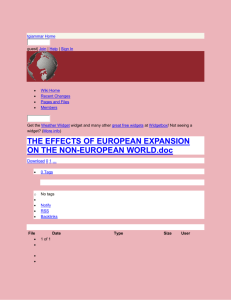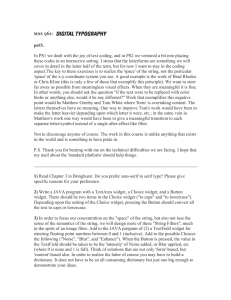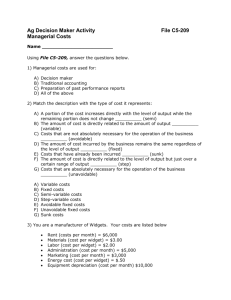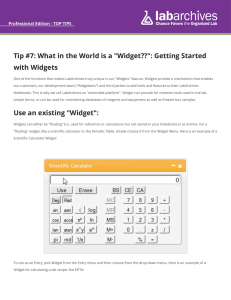MIDTERM EXAM Pull Down Menu Example Pulldown Menus in IDL
advertisement
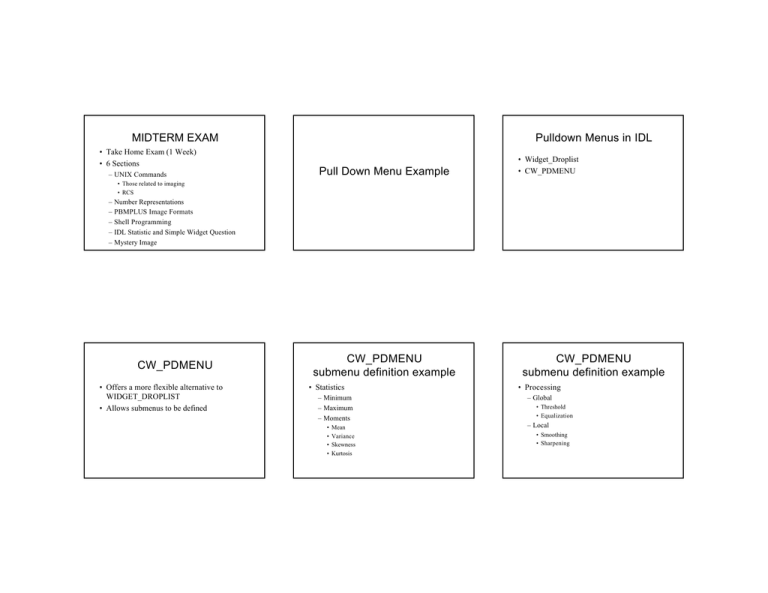
MIDTERM EXAM
• Take Home Exam (1 Week)
• 6 Sections
– UNIX Commands
Pulldown Menus in IDL
Pull Down Menu Example
• Widget_Droplist
• CW_PDMENU
• Those related to imaging
• RCS
– Number Representations
– PBMPLUS Image Formats
– Shell Programming
– IDL Statistic and Simple Widget Question
– Mystery Image
CW_PDMENU
• Offers a more flexible alternative to
WIDGET_DROPLIST
• Allows submenus to be defined
CW_PDMENU
submenu definition example
• Statistics
– Minimum
– Maximum
– Moments
•
•
•
•
Mean
Variance
Skewness
Kurtosis
CW_PDMENU
submenu definition example
• Processing
– Global
• Threshold
• Equalization
– Local
• Smoothing
• Sharpening
Menu Definition
Creation and Arrangement of
Submenus in CW_PDMENU
• Based on tag numbers specified below
1 - Root of new pulldown submenu (next button
starts submenu
2 - Last button of current pulldown level
3 - Root of new pulldown submenu, but also the
last button of current pulldown level
0 - Regular menu entry (none of the above)
CW_PDMENU
Widget Definition
pro pd_menu_example
base=Widget_Base(Title='Pull Down Example')
; menu variable defined in previous slide
pd_menu=CW_PDMENU( base, menu, /return_index)
Widget_Control, base, /realize
Xmanager,'pd_menu_example',base
end
Menu Definition
menu=['1\Statistics', '0\Mininum', $
'0\Maximum', '3\Moments', $
'0\Mean', '0\Variance',$
'0\Skewness', '2\Kurtosis', $
'3\Processing', '1\Global', $
'0\Threshold', '2\Equalize', $
'1\Local', '0\Smooth', $
'2\Sharpen' ]
CW_PDMENU Event Handler
pro pd_menu_example_event, event
help,/structure,event
end
menu = [ $
'1\Statistics', $
'0\Mininum', $
'0\Maximum', $
'3\Moments', $
'0\Mean',$
'0\Variance',$
'0\Skewness',$
'2\Kurtosis', $
'3\Processing', $
'1\Global', $
'0\Threshold', $
'2\Equalize', $
'1\Local', $
'0\Smooth', $
'2\Sharpen' ]
Sample outputs of
pd_menu_example
• The following outputs are variations on the
different ways in which CW_PDMENU
returns widget information
• In this case, we have chosen the following
– Statistics->Minimum
– Processing->Global->Threshold
Sample output of
pd_menu_example
using /return_id
Structure <1a355fc>, 4 tags, length=16, refs=1:
ID
LONG
273
TOP
LONG
272
HANDLER
LONG
272
VALUE
LONG
275
Structure <1a355fc>, 4 tags, length=16, refs=1:
ID
LONG
273
TOP
LONG
272
HANDLER
LONG
272
VALUE
LONG
284
Sample output of
pd_menu_example
using /return_index
Structure <1a3561c>, 4 tags, length=16, refs=1:
ID
LONG
307
TOP
LONG
306
HANDLER
LONG
306
VALUE
INT
1
Structure <1a3561c>, 4 tags, length=16, refs=1:
ID
LONG
307
TOP
LONG
306
HANDLER
LONG
306
VALUE
INT
10
Sample output of
pd_menu_example
using /return_full_name
Structure <1a35d7c>, 4 tags, length=20, refs=1:
ID
LONG
341
TOP
LONG
340
HANDLER
LONG
340
VALUE
STRING
'Statistics.Mininum'
Structure <1a35d7c>, 4 tags, length=20, refs=1:
ID
LONG
341
TOP
LONG
340
HANDLER
LONG
340
VALUE
STRING
'Processing.Global.Threshold'
Sample output of
pd_menu_example
using /return_name
Structure <1a35cd4>, 4 tags,
ID
LONG
TOP
LONG
HANDLER
LONG
VALUE
STRING
Structure <1a35cd4>, 4 tags,
ID
LONG
TOP
LONG
HANDLER
LONG
VALUE
STRING
length=20, refs=1:
324
323
323
'Mininum'
length=20, refs=1:
324
323
323
'Threshold'
CW_DEFROI
CW_DEFROI Example
Defining a region of interest (ROI)
• An example of a pop-up compound widget is
the CW_DEFROI
• It is a widget designed to provide a means to
define a region of interest for selective
processing.
CW_DEFROI Example
CW_DEFROI Widget Definition
CW_DEFROI Widget View
• Problem:
– Display an image
– Define a region of interest
– Make the negative of that region
• CW_DEFROI usage specifics
– Works on a draw_widget
– draw_widget must be button and motion event enabled
– Returns indices of pixels defining region of interest
pro cw_defroi_example
base = Widget_Base(/column)
draw = Widget_Draw( base, xsize=256,
ysize=256, /button_events,/motion_events )
roi_button = Widget_Button( base,
value='Define ROI', event_pro='roi_event')
Widget_Control, base, /realize
Widget_Control, draw, get_value=window
image=bindgen(256,256)
global_data={ draw_id: draw, window_id:window,
image_data:image, roi_data: 0 }
Widget_Control, base, set_uvalue=global_data
Xmanager,'cw_defroi_example',base
end
CW_DEFROI Event Handler
pro cw_defroi_example_event, event
end
pro roi_event, event
Widget_Control,event.top,get_uvalue=global_data
window=global_data.window_id & wset, window
image=global_data.image_data & tvscl,image
draw_id=global_data.draw_id
roi=CW_DEFROI( draw_id )
image(roi) = 1-image(roi) & tvscl, image
new_data={draw_id:global_data.draw_id, $
window_id:global_data.window_id,$
image_data:image, roi_data:roi}
Widget_Control,event.top,set_uvalue=new_data
end
Mouse Events
Widget Draw Examples
• To detect mouse input from the user the
following keywords need to be set
/MOTION_EVENTS
• Generates an event whenever the mouse is moved
inside a Draw Widget
/BUTTON_EVENTS
• Generates an event whenever the mouse buttons
are pushed/released in a Draw Widget
Widget_Draw Event
Structure
{WIDGET_DRAW, ID:0L, TOP:0L,
HANDLER:0L, TYPE:0, X:0, Y:0,
PRESS:0B, RELEASE:0B,
CLICKS:0}
PRESS and RELASE
Event Structure Record
• Gives a BIT MASK value of which buttons
on the mouse were pressed/released
• Left-most mouse button corresponds to the
least significant bit
• Middle mouse button corresponds to the
next significant bit
• Right-most mouse button corresponds to
the next significan bit
TYPE
Event Structure Record
0
1
2
3
4
Button Press
Button Release
Motion
Viewport Moved(Scrollbars)
Visibility Changed(Exposed)
PRESS and RELEASE
• Both values are zero (0) when motion
events are generated
X and Y
Event Structure Records
• Gives the location where the event occured
• Note that the location are in DEVICE
COORDINATE with respect to the Draw
Widget
• Measured from the LOWER LEFT
CORNER of Draw Widget
TRACK MOUSE EXAMPLE
• We want to create a Draw Widget which
prints out the location of the mouse to the
screen
track_mouse.pro
pro report_location, event
print,'[',event.x,',',event.y,']'
end
pro track_mouse
base = Widget_Base( Title='Track Mouse' )
window = Widget_Draw( base, xsize=512,$
ysize=512, /motion_events, $
event_pro='report_location' )
Widget_Control, base, /realize
Xmanager,'track_mouse',base
end
DRAW CLICK MOUSE
EXAMPLE
• Similar to the DRAW MOUSE
example
• Line segment will be drawn only when
a button is pressed
• Color of line segment has been
modified to RED
DRAW MOUSE EXAMPLE
• The following example will draw line
segments as the mouse is moved across the
Draw Widget
draw_mouse.pro
pro plot_location, event
plots, event.x, event.y, /device,
color=128,/continue
end
pro draw_mouse
base = Widget_Base( Title='Draw Mouse' )
window = Widget_Draw( base, xsize=512,
ysize=512, /motion_events, $
event_pro='plot_location' )
Widget_Control, base, /realize
Xmanager,'draw_mouse',base
end
draw_click_mouse.pro
EVENT HANDLER
pro plot_location, event
case event.type of
0: begin
plots, event.x, event.y, /device,
color=128,/continue
end
1: ; Button Release
2: ; Motion
3: ; Viewport Moved
4: ; Visibility Changes
endcase
end
draw_click_mouse.pro
WIDGET DEFINITION
pro draw_click_mouse
base = Widget_Base( Title='Draw Mouse' )
window = Widget_Draw( base, xsize=512,
ysize=512, /motion_events, $
/button_events, event_pro=
'plot_location' )
Widget_Control, base, /realize
tvlct, 255,0,0,128
Xmanager,'draw_click_mouse',base
end
Modal Widgets
Modal Widgets
Following slides are obsolete.
Please refer to Chapter 13
(Widget Dialog Programs)
for updated information
pop_fslider Case Study
• Problem: We want to create a simple
slider that a user can call from the IDL
prompt and return to the calling routine a
floating point value reflecting the position
of the floating point slider (CW_FSLIDER)
IDL> a = pop_fslider()
• Modal Widgets also known as pop-up
widgets are a means to simplify a GUI
interface by allowing an input window to
be presented to the user at an appropriate
time
• Because a new window is created and
destroyed, there needs to be a mechanism
to pass the values specified to the used back
to the calling widget.
pop_fslider.pro
(initial version - Widget
Definition)
function pop_fslider
base = Widget_Base( /column )
fslider = CW_Fslider( base, /edit )
quit_button = Widget_Button( base, value="Quit",
event_pro='quit_event' )
Widget_Control, base, /realize
global_data={ fslider_id: fslider, fslider_value: 0.0 }
Widget_Control, base, set_uvalue=global_data
Xmanager, 'pop_fslider', base,
event_handler='pop_fslider_event'
Widget_Control, base, get_uvalue=global_data
print,’In Widget Definition=‘, global_data.fslider_value
return, global_data.fslider_value
end
Variables inside a Widget
• Remember that variables defined in a
widget only exist as long as that widget
exists
• We have to somehow pass out any values
defined to a calling function
pop_fslider.pro
(initial version Event Handler Definition)
pro pop_fslider_event, event
Widget_Control, event.top, get_uvalue=global_data
Widget_Control, global_data.fslider_id,
get_value=fslider_value
global_data.fslider_value=fslider_value
print,’In Event Handler =‘, global_data.fslider_value
Widget_Control, event.top, set_uvalue=global_data
end
pro quit_event, event
Widget_Control, event.top, /destroy
end
pop_fslider.pro
(initial version output)
IDL> a=pop_fslider()
In Event Handler =
44.0000
In Event Handler =
39.0000
In Event Handler =
39.0000
In Event Handler =
42.0000
% WIDGET_CONTROL: Invalid widget identifier: 1.
% Execution halted at: POP_FSLIDER
28
pop_fslider.pro
%
$MAIN$
pop_fslider.pro
(initial version - Widget
Definition)
function pop_fslider
base = Widget_Base( /column )
fslider = CW_Fslider( base, /edit )
quit_button = Widget_Button( base, value="Quit",
event_pro='quit_event' )
Widget_Control, base, /realize
global_data={ fslider_id: fslider, fslider_value: 0.0 }
Widget_Control, base, set_uvalue=global_data
Xmanager, 'pop_fslider', base,
event_handler='pop_fslider_event'
Widget_Control, base, get_uvalue=global_data
print,’In Widget Definition=‘, global_data.fslider_value
return, global_data.fslider_value
end
pop_fslider.pro
(initial version - Event
Definition)
• This does not work because the widget
has already been destroyed and along
with it the uvalue that was being
stored
• To make this work, we need to use
what IDL calls handles (or in C/C++
the concept of pointers)
What are Handles?
IDL Handles (Pointers)
• Handles (pointers) are special
variables that point to memory
locations that are explicitly allocated
by the user.
• It is different from other variables in
that the memory location pointed to
by a handle are persistent (i.e., they
exist from one routine to another)
• It is also the user’s responsibility to
destroy the allocated memory
Uses of Handles
• Management of persistent data
• Minimizes passing around large data
structures
• Linked lists data structures
• Tree data structures
Routines for managing
Handles
• Handle_Create (Create a pointer)
IDL> image_pointer = Handle_Create()
• Handle_Value (Point a handle to data)
IDL> image = bindgen(5,5)
IDL> handle_value, pointer, image, /set
• Handle_Value (Copy data pointed to by the
handle to a new variable)
IDL> handle_value, pointer, a
pop_fslider.pro
(new version Event Handler Definition)
pro pop_fslider_event, event
Widget_Control, event.top, get_uvalue=global_data
Widget_Control, global_data.fslider_id,
get_value=fslider_value
pointer = global_data.handle
print,’In Event Handler =‘, fslider_value
handle_value, pointer, fslider_value, /set
end
pro quit_event, event
Widget_Control, event.top, /destroy
end
Sample use of Handle
Routines
IDL> image_pointer=handle_Create()
IDL> image=bindgen(5,5)
IDL> handle_value, image_pointer, image, /set
IDL> help,image
IMAGE
BYTE
= Array[5, 5]
IDL> help, image_pointer
IMAGE_POINTER
LONG
=
1
IDL> handle_value, image_pointer,a
IDL> help,a
A
BYTE
= Array[5, 5]
Result of pop_fslider.pro
IDL> a=pop_fslider()
In Event Handler =
In Event Handler =
In Event Handler =
IDL> print,a
42.0000
40.0000
43.0000
42.0000
pop_fslider.pro
(new version - Widget
Definition)
function pop_fslider
...
Widget_Control, base, /realize
pointer = Handle_Create()
global_data={ fslider_id: fslider, handle: pointer }
Widget_Control, base, set_uvalue=global_data
Xmanager, 'pop_fslider', base,
event_handler='pop_fslider_event'
Widget_Control, base, get_uvalue=global_data
print,’In Widget Definition=‘, global_data.fslider_value
handle_value, pointer, fslider_value
return, fslider_value
end
